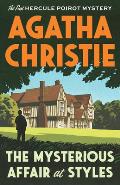Christie Exercises the Little Grey Cells
Reading Agatha Christie’s first novel, The Mysterious Affair at Styles, for the first time, I was struck by how she used dialogue to give hints about action that she never described.
Examining those passages further, it seems clear that Christie uses that technique to make readers’ brains work a little harder—to different purposes.
During an early visit to a pharmacy department of the sort Christie herself was working in, the pharmacist says:
About midway through the book comes another example of the same technique as our narrator, Col. Hastings, interviews a local rustic.
And our brains are so occupied with reassembling that interaction from clues that we don’t notice the farmer hasn’t actually specified which gentleman from the hall has been visiting. Hastings is sure he knows, but, of course, he’s barking up the wrong tree entirely.
Examining those passages further, it seems clear that Christie uses that technique to make readers’ brains work a little harder—to different purposes.
During an early visit to a pharmacy department of the sort Christie herself was working in, the pharmacist says:
“If you people only knew how fatally easy it is to poison someone by mistake, you wouldn’t joke about it. Come on, let’s have tea. We’ve got all sorts of secret stories in that cupboard. No, Lawrence—that’s the poison cupboard. The big cupboard—that’s right.”By making us perform a little extra effort to understand that Lawrence is interested in the poison cupboard, Christie implants him in our minds as a suspect. Actual culprit or red herring? We find out in the end.
About midway through the book comes another example of the same technique as our narrator, Col. Hastings, interviews a local rustic.
“Why, do the gentlemen from the Hall come here often?” I asked, as carelessly as I could.Christie never tells us outright that Hastings has responded to the farmer’s hint by giving him a little tip for his information. We have to recreate that bit of business from the farmer’s words.
He winked at me knowingly.
“One does, mister. Naming no names, mind. And a very liberal gentleman too! Oh, thank you, sir, I’m sure.”
And our brains are so occupied with reassembling that interaction from clues that we don’t notice the farmer hasn’t actually specified which gentleman from the hall has been visiting. Hastings is sure he knows, but, of course, he’s barking up the wrong tree entirely.



No comments:
Post a Comment